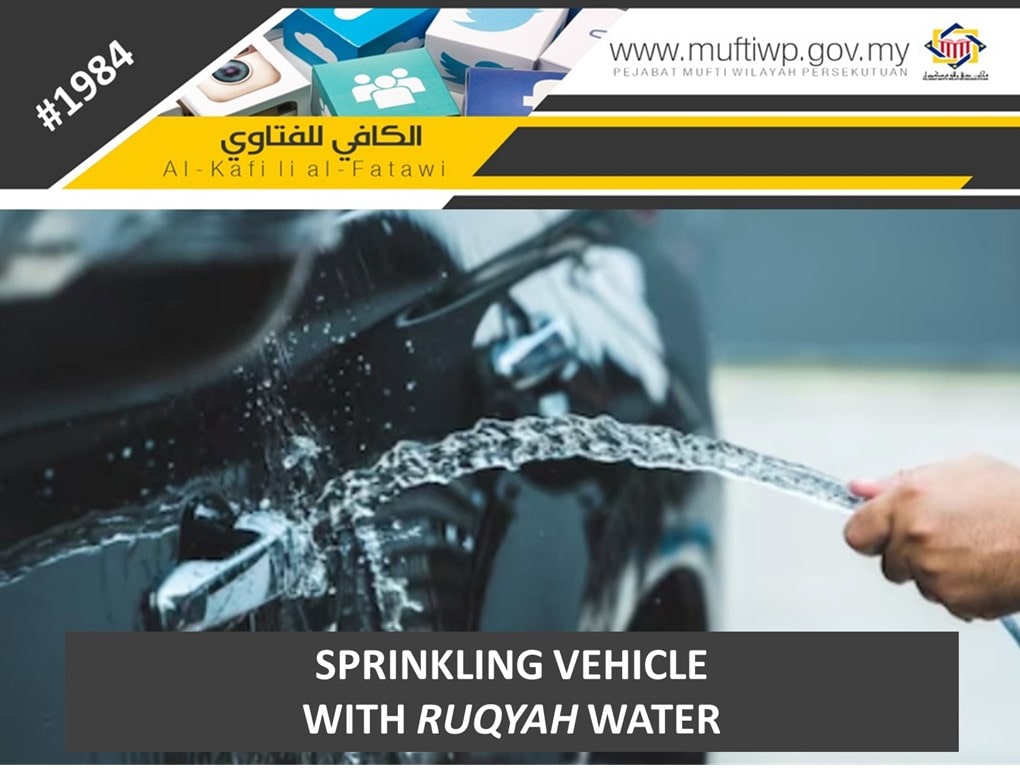
Question
I saw a video of a scholar sprinkling water over a newly purchased car. Some people say that this practice is superstitious and was never done by the Prophet SAW or his companions. What is the Mufti’s view on this matter?
Summary
Sprinkling or washing a vehicle with ruqyah water (Islamic incantation) is permissible and allowed in Islam. This method is mentioned by scholars to perform ruqyah. The argument that it was not practiced by the Prophet SAW and his companions does not mean it is forbidden (haram). Therefore, it is remains recommended (mandub) and permitted (jawaz). This practice is not superstitious and does not contradict Islamic principles.
Detailed Answer
Each Muslim is encouraged to protect themselves, their families, and their belongings from undesirable acts such as theft, accidents, and illnesses, including al-‘ain (the evil eye). The Prophet SAW stated that al-‘ain does exist, and when someone is advised to bathe as a remedy, they should do so. The Prophet SAW said:
الْعَيْنُ حَقٌّ وَلَوْ كَانَ شَىْءٌ سَابَقَ الْقَدَرَ سَبَقَتْهُ الْعَيْنُ وَإِذَا اسْتُغْسِلْتُمْ فَاغْسِلُوا
Meaning: " The influence of an evil eye is a fact; if anything would precede the destiny it would be the influence of an evil eye, and when you are asked to take bath (as a cure) from the influence of an evil eye, you should take bath.”
(Narrated by Muslim)
Some scholars mentioned al-‘ain also affect animals and inanimate objects (al-jamādat), such as trees, stones, cars and others. There are various methods of protection from al-‘ain, such as reciting ruqyah and prayers. Ibn Kathir stated that some early scholars (salaf) would say "ما شاء الله لا قوة إلا بالله"[1] (What Allah wills, there is no power except Allah) when something amazed them.[2]
Another way of protection is to bathe or sprinkle water, as Prophet SAW mentioned “If you are asked to bathe for curing, then bathe”. Thus, sprinkling water on inanimate objects such as house is also permitted. Furthermore, Al-Ma’ani said:
وكذا يشرع قراءة بعض الأذكار والأوراد والتعوذات في ماء ثم يرش به المنزل الذي يتواجد فيه الجن والشياطين ؛ فإنه يبعدهم بإذن الله تعالى. والله الشافي.
Meaning: "It is also permissible to recite certain azkar (remembrances), awrad (litanies), and ta’awwuz (protective supplications) upon the water and then sprinkle it in homes where jinn or devils may be present. This will drive them away by Allah’s permission. Indeed, Allah SWT is the Ultimate Healer."[3]
Therefore, reciting the Quran, zikr and ta’awwuz upon the water, then sprinkled them on a place or object is allowed in Islam and is neither forbidden nor superstitious.
Furthermore, the argument that it was not practiced by the Prophet SAW and his companions does not mean it is forbidden (haram) by the Shariah. Many permissible actions can take place even if they were not done by the Prophet SAW or his companions. This issue is discussed in al-tark (leaving certain actions), whether Prophet SAW had any particular reason or not.
Some people caused confusion to argue if something were good, the Prophet SAW and his companions would have done it before (لو كان خيرًا لسبقونا إليه), which is not true. Sheikh Abdullah Siddiq al-Ghumari stated in his book that:
والترك وحده إن لم يصحبه نص على أن المتروك محظور لا يكون حجة في ذلك بل غايته أن يفيد أن ترك ذلك الفعل مشروع. وإما أن ذلك الفعل المتروك يكون محظوراً فهذا لا يستفاد من الترك وحده، وإنما يستفاد من دليل يدل عليه.
Meaning: "Prophet SAW did not perform any action without references (from the Quran and Sunnah) which is forbidden and cannot be used as an argument for prohibition. Instead, it simply implies that not performing it is also permissible. To say that the act is forbidden requires additional evidence (from the Quran and Sunnah) indicating its prohibition."[4]
Prophet SAW left various things and considered them as not forbidden for reasons. For instance, the Prophet (SAW) refrained from eating dhab (a species of lizard) even offered by his companions because it was not part of his custom but he did not forbid his companions from eating it.[5]
Conclusion
In conclusion, sprinkling or washing a vehicle with ruqyah water (Islamic incantation) and zikr is not superstitious. It is permissible in Islam, as there is no evidence to forbid it. Thus, it can protect any object or vehicle from al-‘ain (the evil eye) or misfortunes.
Allah knows best.
References:
[1] Ibn Kathir, Ismail Ibn Umar, Tafsir al-Quran al-Karim, (Beirut: Dar al-Kutub al-Ilmiah, 1419H), 5/143.
[2] For more on this, see: Al-Afkar #43: The Evil Eye and Its Remedies.
[3] Al-Maʽani, Usamah Ibn Yasin, Mausu’ah Syar’iyyah fi Ilm al-Ruqa, (Amman: Dar al-Ma’ali, 2000).
[4] Al-Ghumari, Abdullah Ibn Siddiq, Husn al-Tafahhum wa al-Dark li Mas'alat al-Tark, (Cairo: Maktabah al-Qahirah, 2002), p.11.
[5] Syed Mohd Jefferi, Saadan Man & Mohd Hafiz, “Bid'ah and al-Tark in Islamic Law: A Preliminary Study”, Shariah Journal, vol.26, no. 3 (2018), p.379-400.

